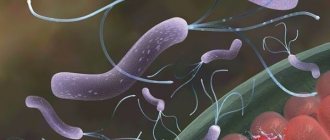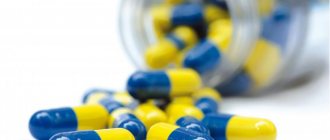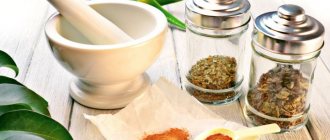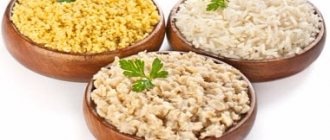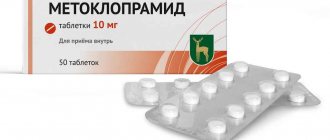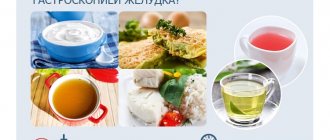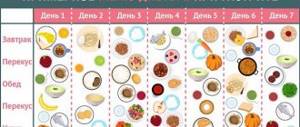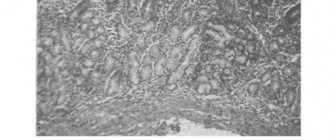Home Diseases and treatment Gastroenterology
23 May 2020, 10:16 Anna 350 No
Almost every person experiences stomach problems: heaviness, heartburn and painful discomfort. Such symptoms indicate that some kind of gastrointestinal disease is developing in the body. In order to prevent deterioration, it is necessary to take immediate action. Preventing the development of a disease is much easier than curing it.
The most common diseases are gastritis and ulcers. This article will talk about exactly what preventive measures need to be taken to prevent the development of gastritis and ulcers.
Prevention of gastritis: methods of preventing the disease
It is known that it is easier to prevent a disease than to treat it later. Activities carried out to prevent the development of the disease are based on the statement.
Prevention, as a part of medicine, is:
- Primary, aimed at preventing the disease;
- Secondary, characterized by eliminating risk factors for an existing disease and preventing exacerbations.
Inflammation of the gastric mucosa
Chronic gastritis is a disease worthy of preventive measures. There are several reasons given:
- Affects the patient's quality of life;
- Leads to ulceration;
- Impaired absorption of nutrients and vitamins;
- The risk of complications is bleeding and stomach cancer.
To understand preventive measures for gastritis, it is necessary to find out the causes of development. Depending on the type of chronic gastritis, the causes are:
- Helicobacter pylori bacterium;
- Treponema, mycobacteria;
- Parasite infestation;
- Viruses, such as herpes.
- Autoimmune mechanisms;
- Medicines;
- Chronic lead poisoning;
- Metabolic disorders;
- Chemicals such as bile;
- Food allergies;
- Radiation damage;
- Smoking;
- Errors in nutrition.
Prevention of chronic gastritis can be public and individual.
Public prevention is based on carrying out measures to protect the population from consuming low-quality products. Government organizations supervise public catering establishments and places where food products are sold. The correctness of food preparation, hygiene of the workplace and the employee himself are monitored.
This especially applies to children's organizations to prevent damage to the stomach and digestive tract due to non-compliance with the rules for storing and preparing food.
Individual prevention concerns each person personally and depends on a number of factors:
- The reason for the development of gastritis;
- Presence of concomitant pathology;
- The presence of gastritis in family members.
Prevention of acute gastritis
Chronic gastritis is the result of lack of treatment or poor treatment of acute gastritis. The most important preventative measure will be to consult a doctor on time and follow treatment recommendations.
Prevention of Helicobacter pylori infection
The research work of scientists B. Marshall and J. Warren was demonstrated in 1983. It was the first to talk about the bacterium Helicobacter pylori as a causative agent of gastritis. The mentioned work changed the way medicine thinks about chronic gastritis.
Helicobacter is transmitted by contact, you will need to follow the following measures:
- mandatory hand washing before eating;
- do not share unwashed dishes, do not taste food from the same spoon, do not drink from the same cup;
- Personal hygiene products are provided individually for each family member.
If an infection is detected in a family member, it is recommended that everyone undergo an examination and, if necessary, take medications.
It is recommended to carry out activities aimed at restoring and improving the functioning of the immune system.
Nutrition
The importance of nutrition in the prevention of gastritis cannot be overestimated.
Diet
The correct percentage of meals: breakfast is dense, rich in nutritional components, dinner – on the contrary, light.
Prevention of gastritis involves limiting salt intake, due to the fact that the foods consumed contain a sufficient amount of sodium chloride for the body.
Drink water in the prescribed amount. Juice, compote, soup, tea and coffee are not water; a bowl of soup cannot replace a glass of water. Moisture is vital for the proper functioning of the body and the fight against an aggressive environment.
Consuming the right fats. You cannot give up fats; lipids are involved in many metabolic processes, for example, in the synthesis of sex hormones.
It is necessary to differentiate the consumption of fats: increase the amount of polyunsaturated fats contained in sea fish, limit the consumption of unsaturated fats found in meat, eggs, and butter.
Both types of fats should be present in the diet.
You will have to sharply limit or abandon the consumption of foods that strongly irritate the gastric mucosa. This includes fried foods, half-baked foods, excess smoked meats, marinades and spices.
The diet should include and alternate cooking methods of different consistency. Excess dry food will prepare the mucous membrane for the development of gastritis.
Treatment of gastritis is accompanied by similar nutritional recommendations.
Food quality
Monitoring the quality properties of products is necessary to prevent gastritis and many other diseases of the digestive tract. The main thing is freshness, eliminating doubts about the quality of food. If doubts arise, the only correct decision is to refuse to use the product for food.
Mode
Regular meals in small portions will prevent chronic gastritis and help activate metabolic processes. This is true for people who are prone to obesity.
Between meals, make small snacks: not chocolate bars and chips, but an apple, grapefruit, low-fat cottage cheese, nuts and dried fruits.
To prevent overstretching of the stomach and damage to the mucous membrane, simultaneous intake of large amounts of food is unacceptable!
Nutrition process
Absorption of food is carried out consciously; rushing and swallowing unchewed portions are not allowed. Chewing makes the stomach's work easier; the organ is not adapted to grinding food. Watching TV or the computer while eating food will not help normalize digestion.
Alcohol consumption
Regular consumption of alcoholic beverages and its substitutes leads to the development of atrophic gastritis. Any alcohol has a toxic effect on the cells of the gastric mucosa, especially if consumption becomes excessive.
Alcohol substitutes can cause severe damage to the esophagus, stomach, liver, and pancreas even with one-time use. This leads to irreparable consequences.
Smoking
Tobacco smoke affects the stomach in several ways:
- Smoking stimulates salivation; when saliva saturated with tobacco smoke products is swallowed, the mucous membrane is damaged and chronic gastritis develops;
- A small amount of nicotine enters the stomach in gaseous form when inhaled;
- The effect of nicotine on the centers regulating appetite and satiety in the brain;
- Once in the blood, nicotine is integrated into the body's metabolic processes and becomes necessary.
Taking medications
Groups of drugs that require careful monitoring of the stomach condition and prescribing gastroprotectors:
- Nonsteroidal anti-inflammatory drugs are medications that should be taken with caution and follow the instructions. These include Aspirin (acetylsalicylic acid), Ibuprofen, Ketoprofen, Indomethacin, Diclofenac.
- Sulfonamides contribute to the development of erosive gastritis. Antibiotics act on the gastric mucosa as toxic substances and allergens;
- Medicines used to treat tuberculosis;
- Anticoagulants such as heparin require differentiated administration, especially when combined with other medications;
- Cytostatics;
- Anticholinergics reduce intestinal motility, thereby promoting stagnation of food, overstretching of the stomach, and the development of gastritis;
- Iron supplements.
When prescribing drugs that have a detrimental effect on the stomach, the attending physician will recommend medications to protect the mucous membrane or reduce the negative effect. You should not self-medicate or take medications uncontrollably.
Occupational hazards
Precautionary measures must be taken if professional activities involve the production or use of toxic substances. The use of personal safety equipment is required: masks, respirators, protective suits.
Chronic infections
Here we talk about infections of the digestive system, specific infectious processes affecting the stomach, and chronic lesions.
When the body is infected with Mycobacterium tuberculosis or the causative agent of syphilis, the gastric mucosa undergoes changes: granulomatous gastritis develops. Prevention is the early diagnosis and treatment of specific infections.
Chronic infections of the oral cavity contribute to the development of gastritis.
Prevention of gastritis in childhood
Gastritis of the stomach in a child develops for reasons different from those in adults.
Features of the development of gastritis in children:
- Physiologically low motor function of the stomach;
- The amount of bacterial agent required for the development of infectious gastritis is significantly less;
- Self-healing often occurs.
Prolonged stress, poor environmental conditions, allergic and parasitic agents become more important among the causes in children. However, preventing gastritis in children is of great importance!
Maintaining a daily routine: adequate sleep, walks in the fresh air, meals at a time. For a child, the regime is a kind of confidence, calmness and, accordingly, the absence of personal experiences.
The family environment should be friendly. This concerns the relationship with the child and the connection between parents.
Breastfeeding plays a major role in the formation of good protective factors in the stomach, and subsequently the correct introduction of complementary foods.
It is imperative to monitor what the child eats, especially if the family lives outside the city, because all unripe berries and fruits contain acids that irritate the mucous membranes and prepare the stomach for inflammation. It is necessary to monitor the condition of the oral cavity, sanitize chronic foci of infection: treat teeth, throat and inflammation of the tonsils.
If allergic manifestations occur on the skin, a mandatory consultation with an allergist is necessary to prescribe adequate treatment. Allergic gastritis of the stomach often accompanies skin manifestations.
If any disease develops, parents should not try to cope with it on their own. An examination by a pediatrician is necessary to prevent uncontrolled prescription of medications, which contribute to an even greater tendency of the child’s body to allergies.
If someone in the family is diagnosed with Helicobacter, then the child can become infected easily. Therefore, adults should take their treatment seriously: take pills regularly and observe personal hygiene rules.
Parents must be responsible for the health of their child.
Secondary prevention of gastritis
This is prevention aimed at preventing exacerbation of existing chronic gastritis.
To do this, all the rules of primary prevention are followed, which are accompanied by mandatory medical examination and prescription of medications.
Source: https://GastroTract.ru/bolezn/gastrit/profilaktika-gastrita.html
Prevention of chronic gastritis
The chronic stage of the disease appears after inadequate treatment of acute gastritis or when preventive measures for the disease are not followed. Having experienced an exacerbation of the disease once, every effort should be made to prevent it from happening again. Prevention of chronic gastritis follows the same rules as acute gastritis. But some more recommendations are added.
- To maintain normal stomach function, it is recommended to replace coffee and strong tea with drinks made from medicinal plants.
- Treat acute gastritis completely. Even if it takes a year.
- A timely visit to a doctor and examination of the esophagus will save you from complications.
- Do not abuse medications to treat other diseases. Medicines very quickly provoke exacerbation of gastritis.
- Drink alcoholic drinks on special occasions.
- Quit smoking completely.
- Moderate physical labor. A sedentary lifestyle and excessive physical activity negatively affect digestion and the development of inflammatory processes.
Chronic gastritis cannot be cured, but exacerbation can be prevented!
Basic rules for preventing stomach inflammation
Gastritis is one of the few diseases that lasts for a very long period and often becomes chronic. Each exacerbation worsens the condition of the mucous membrane and increases the risk of developing more severe forms.
In order to avoid this, it is enough to pay attention to the prevention of acute gastritis and its protracted forms.
It consists not only of nutrition, but also includes some medications that ease the work of the stomach.
To prevent gastritis, you should adhere to proper nutrition and, if necessary, use special medications
General rules
First of all, let's look at the general rules that are included in the prevention of inflammation. This disease is characterized by a wave-like course. Many factors can provoke the inflammatory process. Accordingly, the prevention of gastritis will be based on maximally limiting contact of the gastric mucosa with possible provoking factors.
The gastric mucosa is in contact only with air and with substances entering the stomach, that is, food and water. Accordingly, prevention comes down to quality control. In this regard, all activities can be divided into two large groups:
- Social events. They consist of food quality control. This also includes monitoring the quality of drinking water. These SES activities are being carried out. Such organizations conduct inspections not only of store products, but also of the entire production cycle. In addition, wastewater treatment and disinfection are carried out to eliminate infectious contamination. This will help reduce the risk of developing toxic gastritis.
Controlling the quality of drinking water reduces the risk of infectious gastritis
- Individual preventive measures include compliance with the rules independently by each patient. This includes not only the organization of nutrition, but also its hygiene, taking medications, and eliminating provoking factors.
Only if all the rules are followed, the prevention of gastritis will have the desired effect and will allow you to achieve stable remission.
How to exclude acute gastritis
The acute process in most cases occurs as a result of malnutrition, in the presence of an infectious factor, and so on. Thus, to exclude an acute process, the following rules should be followed:
Proper nutrition
It involves giving up processed foods, fast food, fatty meats and hot spices. The listed products, when consumed regularly, have an irritating effect on the mucous membrane and cause acute inflammation. In addition, when creating a menu, it is important that dry and liquid dishes alternate.
Fast food is not recommended to be included in the diet
Product quality
To exclude infectious and toxic factors, it is important to eat only fresh foods. It is for this reason that it is recommended to refuse to buy ready-made dishes, since you cannot be sure of their quality. At home, meals should also be prepared only from fresh ingredients and prepared foods should be stored correctly.
Portion size
Eating large amounts of food, even if it is well prepared, has a negative effect on the stomach. This causes stretching of the stomach walls and also slows down the digestion process.
When eating food in small portions, even the ingestion of low-quality products will cause a less pronounced negative effect.
To prevent stomach inflammation, you should eat small portions
Eating process
In the stomach, food is broken down by acids. If it comes in large pieces, then its digestion slows down. In addition, unchopped food irritates the mucous membrane. Therefore, it is important to eat slowly, chewing each portion thoroughly.
Alcoholic drinks
It is important to remember that even in minimal quantities they negatively affect the condition of the mucous membrane. If you use low-quality drinks, you can provoke acute gastritis.
The same goes for smoking.
Nicotine does not have a direct effect on the gastric mucosa, but it worsens the condition of blood vessels, which means that the tissues no longer receive enough nutrients, and the regeneration processes proceed much more slowly.
Chemical substances
It is important to remember that all kinds of chemicals can have a negative effect not only if they enter the stomach, but also if the vapors are inhaled. It is especially dangerous that this provoking factor can cause erosive gastritis with heavy bleeding. Prevention of gastritis in this case involves the use of personal protective equipment.
Timely dental treatment will help prevent the development of purulent gastritis
Separately, purulent gastritis and its prevention should be considered. The only way to prevent purulent inflammation is to promptly treat infectious pathologies of other organs, including teeth. In addition, it is important to follow the rules of asepsis when performing abdominal manipulations.
Chronic process and its prevention
Chronic gastritis is slightly different from acute gastritis in terms of etiology. Here, provoking factors can be stress, increased workload, and so on. This is what the prevention of inflammation will consist of:
- Physical activity – moderation is important here. Excess load, as well as its lack, can negatively affect the condition of the stomach. Therefore, if you have decided to engage in a certain sport, it is important to individually select the level of load.
Moderate physical activity has a positive effect on the functioning of the whole body, including the stomach.
- Psycho-emotional state - any stress can trigger a relapse of the pathology. That is why it is important to avoid worries and shocks whenever possible.
- Taking medications – medications are especially often irritating to the gastric mucosa. Therefore, to prevent gastritis, it is recommended to avoid taking medications such as Aspirin, Aspecard, NSAIDs, and antibiotics on an empty stomach. If you plan to take these medications for a long time, it is recommended to take medications such as Venter, Almagel or Omeprazole in parallel.
- Prevention of relapses - patients with inflammation of the stomach most often experience worsening of their condition in the autumn-spring period. Accordingly, it is recommended to start taking medications prescribed by your doctor in advance.
- Dispensary registration is also important. It is important, even if there are no complaints, to see a doctor once a year. During the visit, further treatment tactics are discussed, preventive measures are determined and medications are selected.
Regular doctor's examinations will help to detect stomach diseases in time.
Normalization of secretion
Even with a prolonged form, it is especially important to take medications regularly. They will help normalize acidity. Accordingly, they are selected only based on the level of secretion.
If there is insufficient acid production, it is important to stimulate the glands. For this purpose, Pepsinogen, Abomin or Panzinorm are prescribed. Gastric juice has an excellent effect.
Drugs that improve digestion processes, in particular Mezim, Festal or Creon, would be useful.
The choice of medication and its dosage are determined only individually based on the results of examinations.
If the acidity is high, it is important to dilute the existing acid in the stomach and slow down the production of new one. Accordingly, antacids would be appropriate.
In addition, it is important to protect the mucous membrane from irritating factors and this is achieved with enveloping drugs. As a result, it is possible to get rid of pain and heartburn.
For hyposecretory gastritis, the following medications are used: Almagel, Maalox, Vikalin and so on. To achieve the effect, you will have to take such drugs up to 7 times a day.
To prevent gastritis, medications are prescribed that protect the gastric mucosa
The listed drugs help reduce existing acid. In addition, they create a film that protects the mucous membrane from irritation. In addition to them, it is important to select medications that inhibit the release of juice. In this situation, Ranitidine, Cimetidine, and so on would be appropriate. These drugs should be taken especially carefully so as not to provoke a sharp decrease in acidity.
Sometimes hypersecretory gastritis occurs with severe secretion disorders. In such a situation, antacid drugs no longer provide the desired effect. Therefore, we have to choose other drugs.
Even with very high acidity levels, drugs such as Omeprazole, Nexium and Emanera can improve the condition. In some cases, it is enough to take just one tablet to achieve the effect.
In addition, the active components continue to act for another three days after administration.
Additional medications
In addition to the above, other drugs can be used to prevent inflammation. They are selected based on the degree of damage to the mucous membrane and the stage of the pathology.
For preventive purposes, it is recommended to take drugs that coat the gastric mucosa
Important: in parallel with taking medications, you need to follow a diet. If this factor is ignored, there will be no effect from therapy.
Doctors use the following medications to normalize the condition in acute and prolonged gastritis of any form:
- normalization of acidity when it decreases - Pancreatin;
- improvement and reduction of heartburn - Rennie;
- normalization of organ motility and elimination of gastric blockage - Motilium;
- improvement of digestion and breakdown of food – Mezim;
- reduction of pain and normalization of secretion outflow - No-shpa;
- reducing acid production and protecting the mucous membrane from irritation - Phosphalugel;
- quick help for pain due to increased secretion - Almagel.
If you have severe heartburn, you should take Rennie
There are a huge number of medications for the prevention of gastritis and even more folk recipes, but they should be used only after the diagnosis has been confirmed.
Do not take acid pills if you feel heavy after eating. This symptom can be provoked not only by low acidity, but also by superficial inflammation with hypersecretion.
That is why it is important to select medications only with a therapist after a full examination. At the same time, a suitable diet and a list of permitted products are determined.
What measures will help prevent stomach inflammation and how to eat properly? The video contains the answers:
Source: https://OZhkt.com/zheludok/gastrit/profilaktika-gastrita.html
How to prevent gastritis and stomach ulcers
Acute gastritis and exacerbation of chronic gastritis occurs suddenly under the influence of unfavorable factors. Preventive measures consist of neutralizing the harmful effects on the digestive organs.
Prevention at the state level. Numerous food quality control services check each of them, allow them to be produced, sold, or prohibited. Each product contains an indication of its composition, which allows you to determine how beneficial or harmful it is.
Individual prevention of gastritis and stomach ulcers is carried out independently by each person. Requires compliance with certain rules and doctor’s instructions. In most cases, the culprit of gastritis is a person’s negligent attitude towards their health and the quality of food. Since the ulcer develops against the background of gastritis, the sick person must adhere to a certain diet constantly.
Preventive measures for gastritis
Prevention of gastritis - nutritional rules aimed at preventing inflammation of the gastric mucosa and the development of gastritis. Preventive measures consist of two directions: against chronic gastritis and against acute forms of the disease.
Prevention of general importance
Acute or chronic gastritis occurs suddenly and suddenly. Inflammation of the gastric mucosa does not occur on its own - the negative impact of the environment is to blame.
Prevention aims to limit a person's negative exposure to such conditions. Thus, the formula is based on the principle: no factor - no gastritis.
Prevention of general importance applies to both acute and chronic forms of the disease.
The gastric mucosa usually communicates with air and food entering the esophagus. In this regard, prevention is based on a process of control. Events include two types:
- Public prevention – refers to government forms of control, because The activities are carried out by employees of sanitary and epidemiological services. Accounting is carried out according to the plan: catering establishments, points of sale of food products, distilled water, sewage channels - all these are objects of state control. With inadequate checks, widespread epidemics of acute gastritis infection begin. It is important to prevent the disease in time and block the channels of its spread.
- Individual prevention consists of following the rules of personal hygiene. The quality of products consumed, diet and other procedures require careful attention on a subconscious level. Reducing the risk of gastritis depends on the correct implementation of all instructions.
Preventive complex for the prevention of gastritis
- Diet . Should include limiting fast food, fried and raw foods, as well as excessive consumption of meat, fish or seasonings. Such food affects the mucous membrane of the human stomach. Instant inflammation of the organs occurs, so you need to include both liquid and dry foods in your diet, dividing them into daily meals;
- Products. If you find food products of questionable quality, it is better to refuse to eat them. It is recommended to adhere to the rule of including only fresh foods in your diet. This is especially true when visiting public catering, because... the products of these establishments may be questionable. It is important to monitor the packaging of the product, its integrity, compliance with quality standards and other parameters;
- Meals. Regularity of meals refers to the level of preventive measures to prevent acute forms of gastritis. You should not violate the established time for meals. Otherwise, this leads to abnormal gastric secretion. Timely consumption of food eliminates the risk of contracting gastric gastritis;
- Quantitative composition of products. Overeating, as well as starvation, accompanies us throughout the entire conscious part of our lives. An excess of food leads to disturbances in the stomach, and a deficiency dehydrates the body;
- Procedure. A quiet place to eat, chewing small pieces thoroughly, and leisurely behavior are the main factors in the prevention of gastritis;
- Bad habits. The negative effects of alcohol lead to inflammatory effects in the gastric mucosa. The disease makes itself felt from an excess of alcohol substitute. An additional danger is the presence of tobacco smoke. This is an indirect poisoning of the body, flowing into the inflammatory process of the smoker’s gastric mucosa;
- Chemical poisoning. Reagents and toxic substances often lead to gastritis in acute forms. The patient experiences the opening of ulcers and erosions. Chemical gastritis requires immediate hospitalization. Prevention includes ventilation of the room and the use of skin and respiratory protection;
- Pustules and phlegmons. The inpatient treatment regimen implies compliance with all doctor’s instructions. In this case, it is necessary to observe antiseptic measures to neutralize gastritis pathogens.
Prevention of chronic gastritis: what you need to know
The general nature of the preventive complex combines measures to prevent both acute and chronic forms of gastritis. There is also an additional set of measures related to the prevention of exclusively chronic inflammation of the gastric mucosa:
- Physical exercise. Overwork or lack of physical activity affect the course of chronic gastritis. Physical activity should not exceed a person’s abilities - in other words, the body should not be overloaded during the treatment of gastritis;
- Stressful situations. Chronic gastritis excludes psychological and emotional shocks to the patient. Stressful situations activate the secretion and motor functions of the stomach. This only aggravates the already unpleasant course of gastritis;
- Antibiotics. Medicines that irritate the gastric mucosa should be limited. This especially applies to drugs containing acidic and anti-inflammatory components. If it is impossible to replace these medications, it is necessary to take light forms of medications that do not irritate the patient’s gastric mucosa;
- Prevention and treatment. Chronic gastritis requires timely and regular treatment for relapses. Usually this is the time of spring and autumn 2 times a year. Additionally, the doctor will inform you about the treatment time. If gastritis worsens, treatment should begin immediately, regardless of the time of year. The prophylactic complex helps eliminate the inflammatory effect of the gastric mucosa;
- Doctor's appointments. Gastroenterologists and therapists deal with all forms of identifying gastritis. The patient is registered at the dispensary, after which he undergoes examination and diagnosis of the disease. Based on the data obtained, the doctor creates an individual diet for the body, informs about the rules, and prescribes medications.
Gastroenterologist, nutritionist Galina Ivanovna Afanasyeva
Source: https://disbakteriozz.ru/zhkt/profilaktika-gastrita.html
Basics of gastritis prevention
Gastritis is a long-term pathological process in which pathological processes occur in the gastric mucosa. It becomes inflamed, digestion processes are disrupted, and the person experiences significant discomfort. What preventive measures for gastritis exist and what do they consist of?
Causes of gastritis
In order to better understand the measures to prevent gastritis, you need to understand the reasons for its occurrence. All factors that stimulate gastritis can be divided into two categories: external and internal. Let's look at each of the groups in a little more detail.
External factors
- Eating disorder.
When a person eats dry food, chews food poorly and is in a hurry, consumes a lot of rough food, eats food with a lot of marinade, hot and spicy seasonings, and other substances that can unnecessarily irritate the gastric mucosa and stimulate the production of hydrochloric acid. The stomach can also become thermally irritated when the patient drinks too hot drinks or eats overly heated food. - Excessive alcohol consumption.
The fact is that alcohol disrupts the processes of mucus formation and stimulates the desquamation of the surface layer of the gastric mucosa, disrupts regeneration processes and blood circulation. When a person drinks alcohol for a long time, the epithelium of the stomach begins to change its structure and severe trophic changes appear in the gastric mucosa. - Harmful work (a person breathes dirty air or is under the influence of toxic substances). Carcinogens enter the body in the air and also irritate the gastric mucosa.
- Incorrect use of drugs from the NSAID group.
Non-steroidal anti-inflammatory drugs can negatively affect the functioning of the entire gastrointestinal tract, the mucous membranes are also greatly affected. - Difficulty chewing due to worsening mobility of the temporomandibular joint or dental pathologies.
A person eats unprocessed food and when it enters the stomach, a lot of effort is put into digesting it. This causes acidity to increase, and as a result of this process the stomach is damaged. - Long-term smoking (the worst thing is if a person smokes without first eating). Tobacco smoke causes hyperplasia and hyperfunction of the parietal cells of the gastric mucosa, negatively affecting its motility and the process of mucus synthesis.
Internal factors
- Pathologies in the gastrointestinal tract, including those of a chronic nature.
- Helicobacter pylori infection. The vital activity of the bacterium and the products it produces can disrupt digestive processes.
- Metabolic disorders.
- Autoimmune pathologies.
Immunity is the body’s protective barrier against the influence of many external factors. If it is weak, the body can easily be disabled. - Diseases of the endocrine system.
- Cardiovascular and pulmonary failure.
- Renal dysfunction.
When a person has a very strong immune system and leads a more or less healthy lifestyle, he has a very low risk of developing gastritis.
Prevention of pathology
As you know, gastritis can have general and chronic forms. They differ in their course and specificity, but the basic principles of preventing these pathologies are very similar to each other. There are some specific principles of preventive measures:
- Availability of physical activity. When there is not enough of it or, on the contrary, it is present in excess, the body suffers. This can negatively affect both chronic and acute gastritis. For each patient, the degree and type of load must be selected individually.
- Psycho-emotional activity. It is better to limit patients with gastritis from unnecessary stress or nervous overload. Such processes disrupt gastric peristalsis, motility, and secretory processes. In addition, as a result, the inflammatory process can only worsen.
- Restrictions on drug exposure. Some drugs greatly interfere with the activity and condition of the stomach. Such drugs include acetylsalicylic acid derivatives, NSAIDs, and antibiotics. If it is impossible to stop taking such medications, then their negative effects should be stabilized with gastroprotective drugs.
- Timely therapeutic measures for gastritis. 2 times a year, patients with gastritis experience an exacerbation, usually this happens in the spring and autumn seasons. If a person has had a relapse, then treatment measures should not be postponed under any circumstances.
- Observation by a gastroenterologist. Absolutely every person who is prone to or already suffers from gastritis should have a highly qualified specialist who will observe him and, if something happens, will be able to promptly identify the pathology and prescribe treatment.
Source: https://gastrit.guru/lechenie/profilaktika-gastrita.html
Acute gastritis
Acute gastritis
is an acute inflammation of the gastric mucosa caused by short-term exposure to strong irritants. For reasons of development, primary (exogenous) and secondary (endogenous) acute gastritis are distinguished.
Etiology
The leading factors in the development of primary gastritis are infection of food by microorganisms (staphylococcus, salmonella, shigella, E. coli) due to direct contamination of baby food, as well as improper storage of infant formula;
as well as chemical irritants (acids, alkalis, household chemicals, arsenic and phosphorus compounds) and medications (antibiotics, sulfonamides, bromine, iodine preparations, antimetabolites), food allergens. Secondary acute gastritis develops against the background of infectious diseases under the influence not only of toxins, but also directly of bacteria and viruses such as diphtheria, influenza, measles, sepsis, acute renal failure, viral hepatitis, pneumonia, typhus. There are reports in recent years (N.P. Shabalov, 2010) about acute gastritis in newborns and children in the first six months of life who were infected in utero from their mother. The development of acute gastritis due to injury to the gastric mucosa by foreign objects, as well as the development of gastritis due to purulent inflammation in the organ adjacent to the stomach, are excluded. It is possible to develop acute gastritis with simultaneous infection with Helicobacter pylori. Volunteers participated in the experiment by infecting themselves with this microorganism to prove its etiological role in the development of acute gastritis and peptic ulcer of the stomach and duodenum.
Mechanism of development of acute gastritis
The stomach has a powerful defense system. Firstly, gastric juice has a high concentration; microorganisms ingested with food or drink die in it. But with massive infection, gastric juice cannot cope with microorganisms and gastritis develops. Quite often there is a combination of allergization by a medication with the action of the microorganisms listed above that have entered the stomach. The mucous membrane of the stomach becomes inflamed, which is manifested by hyperemia, edema, increased mucus formation, and sometimes erosions with hemorrhages appear.
Complaints
10-12 hours after eating poor-quality food, general malaise, lack of appetite, diffuse aching pain in the epigastric region of a bursting nature, sometimes cramping, appear.
40% of patients experience pain in the epigastric region. The patient may vomit once, and in severe cases, vomiting occurs multiple times. The vomit contains undigested food, a lot of mucus, sometimes mixed with blood. The addition of diarrhea indicates the spread of the inflammatory process to the intestines. In the case of an allergic nature of gastritis, allergic rhinitis develops, a rash appears on the body, and sneezing. If a child swallows potent substances, there will be complaints of pain when swallowing, severe pain behind the sternum, and in the mouth.
Inspection data
The patient is pale, vomiting brings relief, his blood pressure decreases, and tachycardia is observed.
The tongue is dry, covered with a gray-yellow coating, pain on palpation of the abdomen, especially in the epigastric region, and flatulence is noted. With gastritis of infectious origin, body temperature rises and dehydration occurs due to persistent diarrhea. The prognosis is favorable, the patient recovers within three to seven days. In case of poisoning with potent substances, corrosive gastritis develops, which is characterized by a long course with the formation of scars on the gastric mucosa. When infected with Helicobacter pylori, acute gastritis most often becomes chronic.
First aid
It is necessary to find out from the anamnesis the cause of acute gastritis and exclude further intake of poor-quality food into the stomach.
It is recommended to perform gastric lavage using 1% sodium bicarbonate solution, 0.9% solution of table salt, boiled or mineral water. In the first 12-20 hours you should not eat, but only drink weak tea or water. Drinking should be fractional using rehydron, mineral water of low mineralization. After 20 hours, you can eat slimy soups, liquid pureed porridge, drink kefir, jelly, fruit jelly. As the patient's condition improves, you can feed soft-boiled eggs, quenelles, cottage cheese, and meat soufflé.
For intestinal toxicosis, the authors recommend starting oral rehydration with glucose-saline solutions (Rehydron, Oralit, Gastrolit, Glucosalan), alternating them with salt-free solutions (tea, water, rice water).
For ongoing pain, it is recommended to use antispasmodics (no-spa, papaverine), painkillers (belladonna preparations, platiphylline), acid-reducing agents (alma-gel), as well as adsorbents (smecta, cholestyramine). For persistent repeated vomiting, use cerucal or motilium; for high temperatures, antibiotics or sulfonylamines are prescribed.
Встречи проходят в уютной квартире, проверенные феи проститутки Мурманска по вызову, горячий и раскованный досуг с oopsmurmansk.ru. Внимательно посмотрите на список услуг проститутки, которые владелица анкеты устанавливает самостоятельно. Темпераментные проверенные феи проститутки Мурманска по вызову, сладкие и ухоженные, они такие игривые и профессиональные, что ты не устоишь перед ними. Выбери девушку сейчас.
